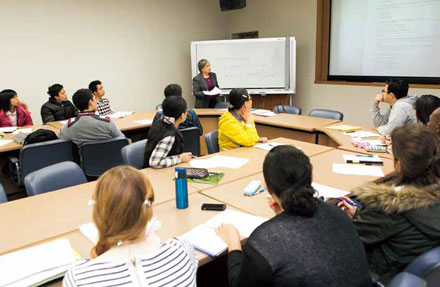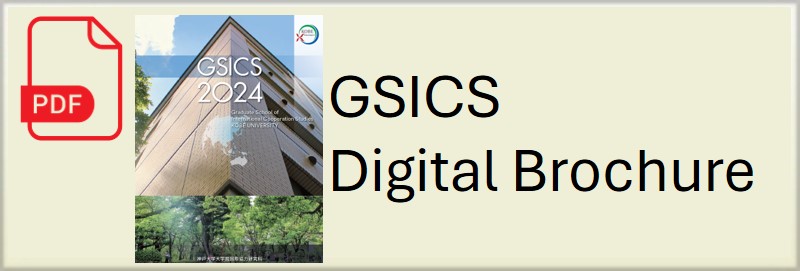
Distinctive Features
In an effort to better meet the requirements of a changing world and to make our unique multidisciplinary academic environment available to as many people as possible, the Graduate School of International Cooperation Studies (GSICS) has developed a Master’s Program in English for international students where all instruction is conducted in English. As rapid globalization encompasses more and more of the world, English has become an essential aspect of international cooperation in Japan, as well as in many other countries. Moreover, in recent years, the Japanese government has given increasingly high priority in its ODA policy to the development of human resources.
The Program in English seeks to meet the needs of both the international community and Japan. It takes an interdisciplinary approach, emphasizing not only the study of basic areas such as economic development, political development, international law and international relations, but also the ways these disciplines intersect and relate to one another. It is hoped that graduates of the program will become experts in their fields, and will contribute toward the development of their countries and international society.
The English program starts from October.
Study Requirements and Degrees Granted
The standard duration of study is two years. Students are required to earn at least 30 credits (those who understand Japanese are allowed to take up to 12 credits from among the subjects offered in the GSICS Program in Japanese), complete a master's thesis in English, and pass a final oral examination. Particularly accomplished students may finish the program in one year. Students who successfully complete the requirements are granted one of the following degrees: Master of International Studies, Master of Economics, Master of Laws, or Master of Political Science.

Curriculum
| Class Subject | Credits |
|---|---|
| Microeconomics | 2 |
| Macroeconomics | 2 |
| Monetary Theory | 2 |
| Public Finance | 2 |
| International Economics | 2 |
| Mathematics for Social Sciences | 2 |
| Statistics | 2 |
| Econometrics | 2 |
| Growth Theory | 2 |
| Economic Development Studies | 2 |
| Socio-Economic Development Theory | 2 |
| Environmental Economics | 2 |
| Development Management | 2 |
| International Development Cooperation | 2 |
| Human Capital Development | 2 |
| Social Research Methods for Development | 2 |
| Special Lecture on Development Economics | 2 |
| Special Lecture on Development Policy | 2 |
| Special Lecture on Development Planning | 2 |
| Special Lecture on Development Management | 2 |
| Introduction to International Cooperation Law | 2 |
| Introduction to International Human Rights Law | 2 |
| Introduction to Law of International Organiztaions | 2 |
| Introduction to International Environmental Law | 2 |
| International Criminal Law | 2 |
| International Security and International Law | 2 |
| Class Subject | Credits |
|---|---|
| Law and State Building | 2 |
| Law and Economic Development | 2 |
| Law and Social Development | 2 |
| International Labor Law | 2 |
| Introduction to Political Analysis | 2 |
| Japanese Politics | 2 |
| Political Development | 2 |
| Local Government | 2 |
| Principles of Political Research | 2 |
| International Relations | 2 |
| Issues in Peace and Development I | 2 |
| Issues in Peace and Development II | 2 |
| Japanese ODA | 2 |
| Disaster Risk Management | 2 |
| Post-Disaster Recovery Planning | 2 |
| Demography | 2 |
| Medical Anthropology | 2 |
| Environmental Health | 2 |
| Special Lecture on International Cooperation Law | 2 |
| Special Lecture on Transnational Relations | 2 |
| Special Lecture on Political and Social Development | 2 |
| Special Lecture on Institution Building | 2 |
| Academic Writing | 2 |
| Law of the International Civil Service | 2 |
| International Field Work | 2 |
| Internship | 2 |
| Special Seminar | 2 |
The language of instruction for this curriculum is English.









